In our modern data-dominated reality, companies continuously receive information from different sources: sales, customer communication, marketing campaigns, and so forth. However, raw data as such is not the source of clarity; it has to be organized, available, and in context. That is where the data warehouse software can be used. These robust systems assist companies in storing, structuring, and analyzing huge data effectively.
Both startup and enterprise organizations can greatly benefit by using the right data warehouse tool related to decision-making and business strategy. This blog will examine the best data warehouse tools and what capabilities they offer to help your team unravel the complex landscape of big data, bringing fast and accurate actionable insights to your team like never before.
What are the Data Warehouse Tools?
Data warehouse software are ready-to-go programs or platforms to make the activity of collecting, storing, managing, and analyzing large amounts of data coming from various sources, including databases, spreadsheets, and cloud services, but also IoT devices, more convenient. This centralization makes the data management smoother, and there is no necessity to traverse the several data silos.
A data warehouse’s main function is to make the process of retrieving and analyzing data easier. With the use of data warehouse software, you can select the level of granularity or detail that should be stored, including the details of business transactions.
List of 10 Best Data Warehouse Tools
1. Amazon Redshift
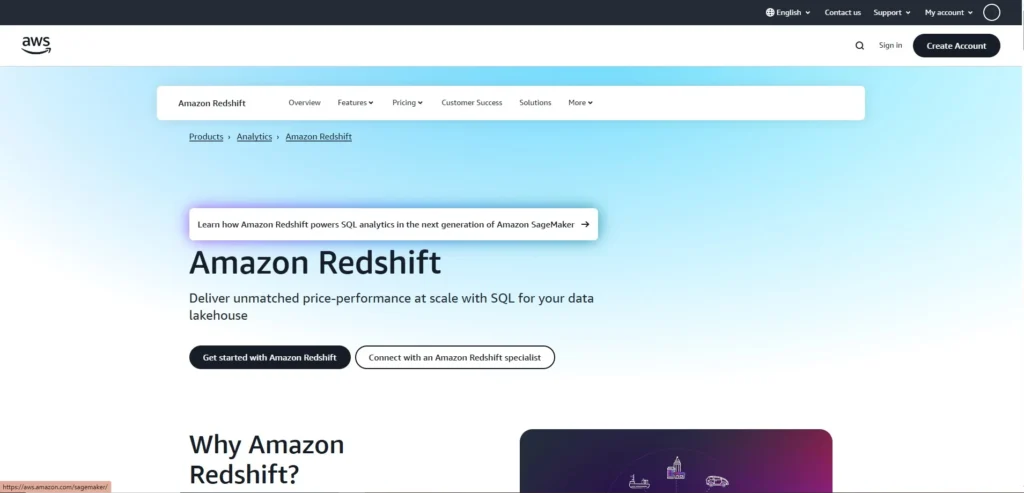
Amazon Redshift It is a fully managed, cloud-based data warehouse of AWS. It can carry out fast queries through columnar storage and massively parallel processing (MPP). Redshift is a perfect solution for businesses that process large amounts of data and allow SQL-based analytics, and have an easy connection with other AWS services.
Its prerequisites include self-oriented backups, scaling, and security that is formidable; thus, it is a magnificent alternative for enterprises. Redshift offers an inexpensive option for data warehouse and BI workloads within the cloud environment through a pay-as-you-go fee structure.
Pricing:
- Free trial for 2 months.
- Pricing starts at $0.25 per hour.
Features:
- Fully managed cloud-based data warehouse
- Columnar storage and Massively Parallel Processing (MPP)
- Seamless integration with AWS services
- High-speed SQL query execution
- Automated backups and snapshot support
- Data encryption and access controls
- Scales to meet high concurrency demands
- Amazon AI tools
2. BigQuery
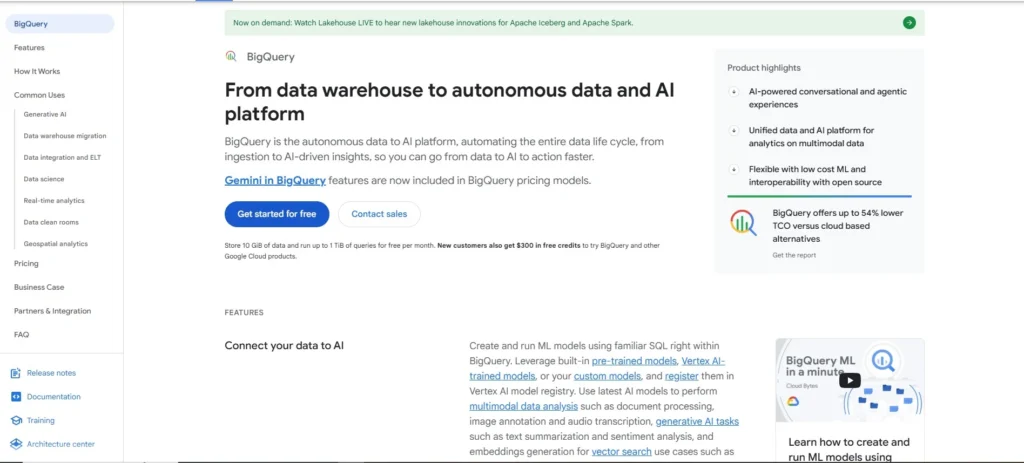
A serverless, highly scalable data warehouse designed to execute SQL queries on big data sets quickly is Google BigQuery. Being a component of Google Cloud Platform, BigQuery decouples compute and storage so that you can scale them independently.
It enables real-time data processing, machine learning, and geospatial analysis. BigQuery works perfectly with other Google tools and is ideally deployed in organizations that have an inclination towards using data science tools and advanced analytics. Its convenient interface, high security, and pay-per-query charge model are the features that make it an excellent analytical solution in contemporary society.
Pricing:
- Storage costs $0.020/GB/month. Querying starts at $5 per TB, with 1 TB free monthly.
Features:
- Fully serverless with automatic scaling
- Real-time data ingestion and processing
- Pay-per-query pricing model
- Built-in support for machine learning and geospatial data
- Seamless integration with Google Cloud services
- Intelligent query optimization and caching
- Enterprise-grade security and compliance
3. Snowflake
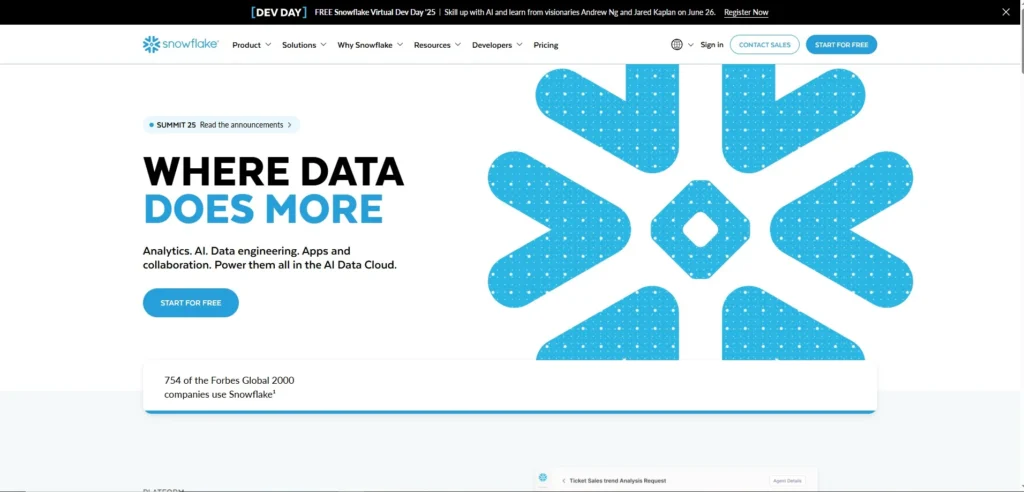
Snowflake is a cloud-native data warehouse that is characterized by flexibility, performance, and ease of use. It decouples compute, storage, and services layers so that each of them can be scaled independently and optimized for performance. Snowflake enables structured and semi-structured data, real-time sharing, and easy integration with data lakes and BI tools.
It has an intuitive interface, a high level of security, and functionality in many clouds (AWS, Azure, GCP), so it is suitable for any company. Snowflake charges per use, and it is cost-effective when the business is interested in scaling and cloud-first data products.
Pricing:
- Standard compute costs $0.00056/second per credit. Prices vary by platform, region, and tier.
Features:
- Cloud-native architecture with separate compute and storage
- Supports structured and semi-structured data
- Time Travel and Fail-safe for data recovery
- Secure and seamless data sharing
- Available on AWS, Azure, and Google Cloud
- Scales instantly for concurrent workloads
- Advanced role-based security features
4. PostgreSQL
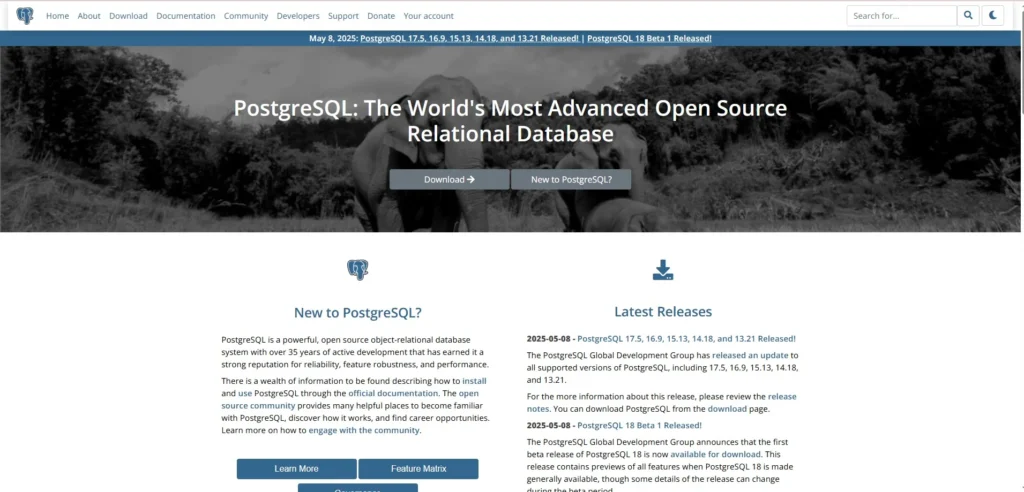
PostgreSQL is an open-source (but strong) relational database that is also a low-cost data warehousing solution. It is high-performing and scalable, with years of continual reliability, and is supported by a very active community with features that include indexing, parallel queries, and JSON support.
It is not a specialized data warehouse application, but it is frequently deployed by organizations of all sizes, including startups and small businesses, to support analytics. PostgreSQL may be installed locally or in the cloud and readily integrates with the majority of the BI tools, which provides a less rigid and cost-efficient alternative to meet increasing data demands.
Pricing:
- Free
Features:
- Open-source and community-supported
- ACID-compliant with strong data integrity
- Advanced indexing and parallel query execution
- JSON and XML support for semi-structured data
- Highly extensible with custom plug-ins
- Compatible with most BI and analytics tools
- Runs on cloud and on-premise environments
5. IBM Db2
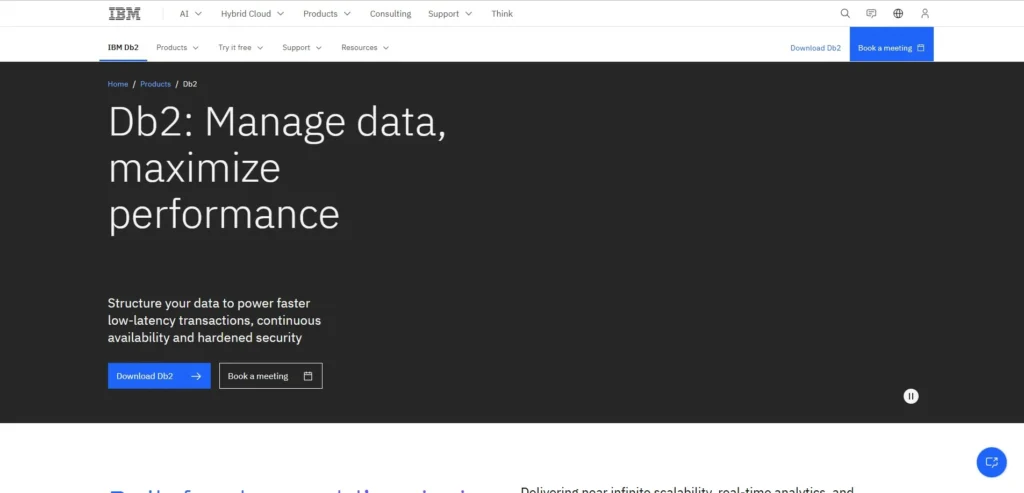
IBM Db2 is a high-performance relational database that is also an efficient data warehouse. Targeting workloads with enterprise usage, it provides in-memory computing, support of machine learning, and optimized query processing with the help of artificial intelligence.
The Db2 supports hybrid cloud deployment and tight data governance and security capabilities. It suits businesses perfectly well in search of in-depth analysis and availability. By being scalable and including automation tools, Db2 assists in managing complex data and processing it effectively, and provides significant insights on both structured data and unstructured data.
Pricing:
- Compute starts at $0.68/hour (Flex One tier). IBM DataStage plans begin at $934/month.
Features:
- AI-powered query optimization
- In-memory computing for fast analytics
- Supports structured and unstructured data
- Built-in machine learning integration
- Hybrid cloud deployment flexibility
- Advanced security and compliance tools
- Seamless integration with IBM Cloud Pak for Data
6. Teradata
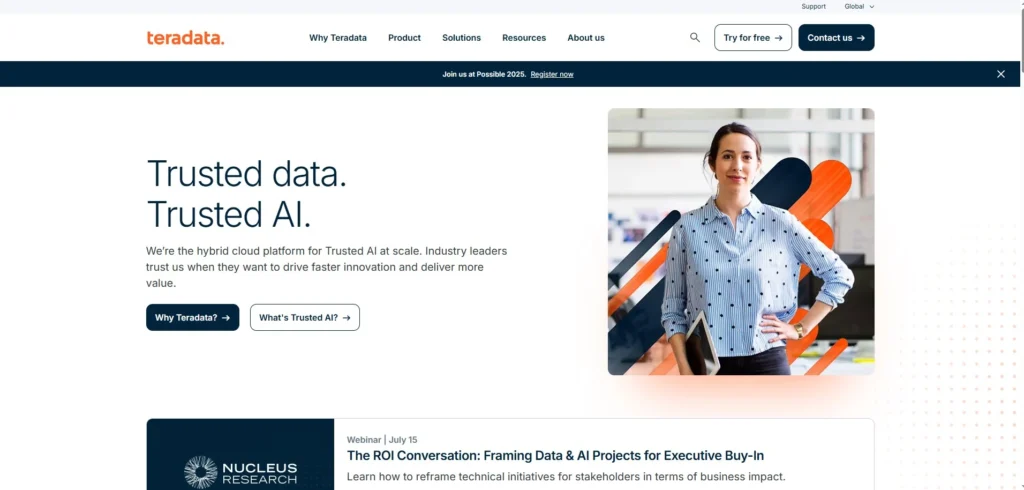
Teradata is a major enterprise data warehouse product that facilitates complex and high-scale analytics on multifaceted hybrid cloud environments. It has SQL, ML, and AI-based workloads and is also high-performing due to its massively parallel processing (MPP) architecture. With Teradata, it is easy to scale and gain significant insights into multi-source data.
It is an excellent solution for large companies with complicated analytical requirements because it includes native capabilities to integrate data, govern, and manage workloads. It is compatible with on-premise, cloud, and hybrid adoption, which enables the enterprise to have the flexibility to manage its big data ecosystem.
Pricing:
- Enterprise plan starts at $9,000/month.
Features:
- Massively Parallel Processing (MPP) architecture
- Scalable across on-premise, cloud, and hybrid models
- Real-time and advanced analytics capabilities
- Supports SQL and NoSQL workloads
- Strong workload management tools
- Enterprise-grade data integration features
- High availability and robust security controls
7. Microsoft Azure
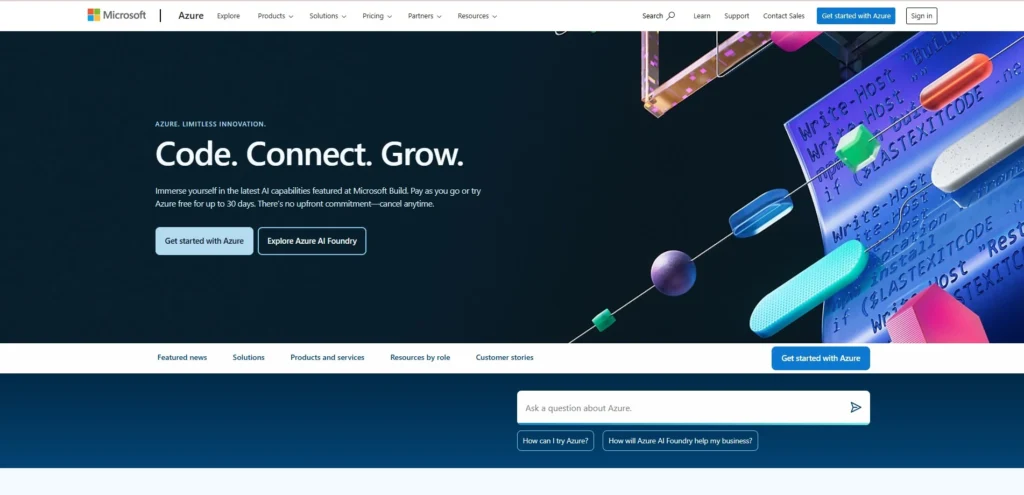
Microsoft Azure is a very dynamic cloud software with a set of data services, including scalable data warehouses. It is bolstered by real-time analytics, AI, and data governance through tools such as Azure Data Lake, Cosmos DB, and integration with Power BI.
Azure is solidly secured, globally available, and also cost-flexible, which is ideal to be use by businesses of any size. It is a first-in-line solution for businesses that are committed to using Microsoft and provides uninterrupted structural synchronization and centralized information handling inside a single powerful cloud framework.
Pricing:
- Azure charges $5 per TB of data processed. Tier-1 pricing starts at $4,700 for 5,000 Synapse Commit Units (SCUs).
Features:
- Comprehensive suite of cloud data services
- Seamless integration with Power BI and Azure ML
- Real-time analytics and data ingestion support
- Strong identity and access management
- Global availability with multi-region deployment
- Developer-friendly tools and APIs
- High-level security and compliance standards
8. Azure Synapse Analytics
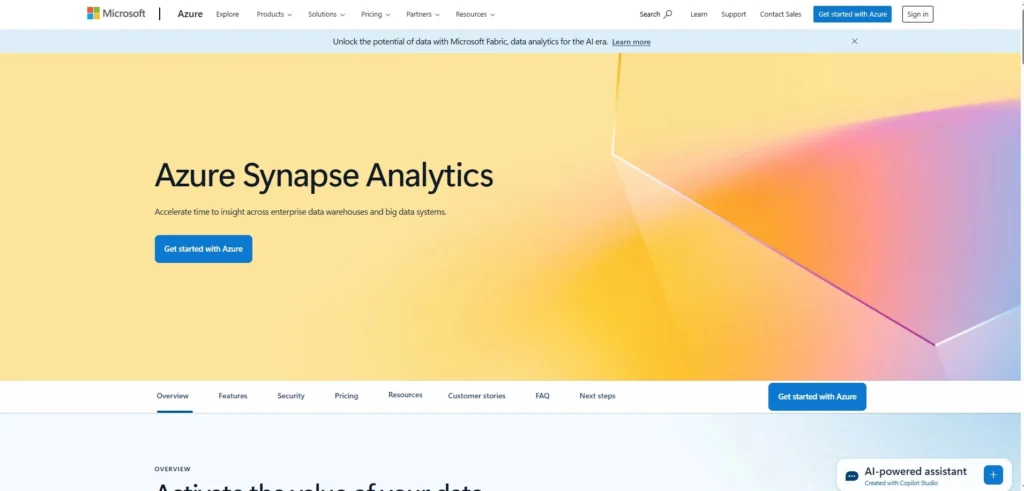
Microsoft’s Azure Synapse Analytics is an integrated analytics solution that combines big data analytics and data warehousing. One can query relational and non-relational information with its serverless or provisioned resources.
Synapse is built to integrate with Power BI, Azure ML, and other Microsoft tools, which make real-time insight, predictive decisions, and machine learning possible. It is a big-scale, enterprise-oriented, with enhanced security and integration capabilities. Synapse is flexible and incorporates AI to become a valuable instrument of present-day data-driven decision-making.
Price:
- Connect with the team
Features:
- Unified analytics for data warehouse and big data
- On-demand and provisioned query processing
- Deep integration with the Microsoft ecosystem
- Supports Spark, SQL, and T-SQL-based queries
- Built-in data security and monitoring tools
- Real-time and predictive analytics support
- Serverless options for flexible querying
9. Oracle Autonomous Warehouse
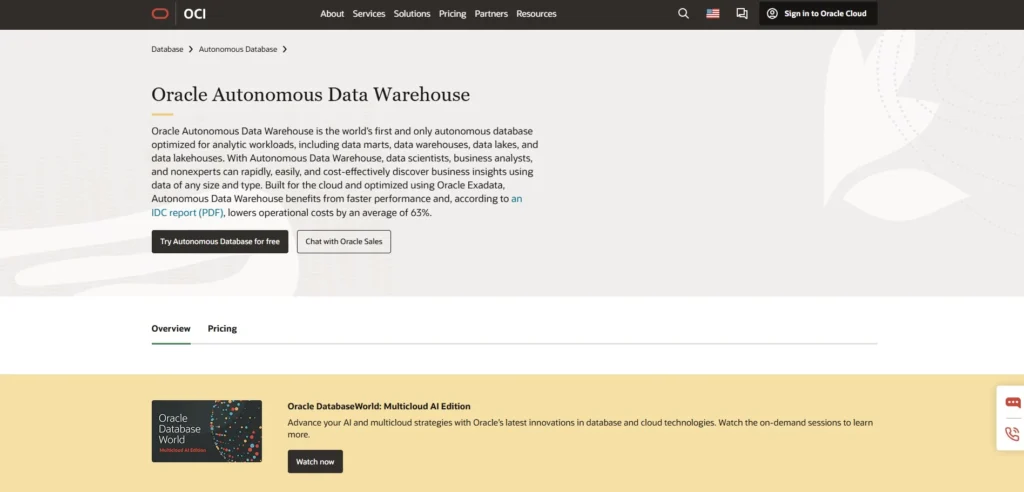
Oracle Autonomous Data Warehouse is an autonomous cloud-based data warehouse that uses machine learning to autonomously tune, back up, secure, and patch itself. It is scalable, simple, and high-performance, and based on Oracle Cloud Infrastructure, suitable for every kind of workload.
It supports SQL, REST APIs, and data visualization tools and can be used by analysts and developers. Being independent, it will require fewer people to take care of the database manually and teams to spend more time on insight and innovation. It is most appropriate in business ventures that require a high-security level and automation.
Pricing:
- ECPU: ₹28.73 per hour
- Exadata Storage: ₹2.09/GB/month
- Backup Storage: ₹2.09/GB/month
- Developer Instance: ₹3.34 per hour
Features:
- Self-driving, self-securing, and self-repairing platform
- Automated tuning, scaling, and patching
- High-speed data loading and querying
- Built-in machine learning and analytics
- Supports SQL, REST APIs, and visualization tools
- Secure user isolation and access controls
- Optimized for Oracle Cloud Infrastructure
10. Cloudera
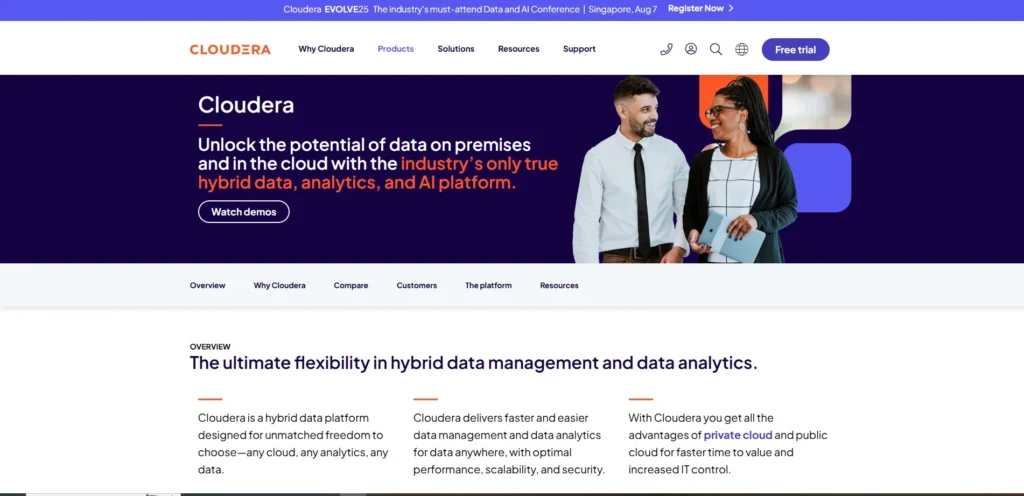
Cloudera delivers a comprehensive hybrid data platform that combines powerful data warehousing capabilities with advanced data analytics tools as part of its Cloudera Data Platform (CDP). It supports real-time data processing, machine learning, scalable analytics, and large-scale data storage across both on-premises and cloud environments.
Cloudera enables consistent querying and actionable insights using technologies like Hive, Impala, and Spark, making it an ideal choice for organizations leveraging open-source data ecosystems.
Pricing:
- $0.07 per CCU (Concurrency Scaling Unit) per hour.
Features:
- Supports Hadoop, Hive, Spark, and Impala engines
- Hybrid and multi-cloud data platform
- Unified solution for warehousing, ML, and real-time analytics
- Centralized security, governance, and lineage tracking
- Open-source-based and highly customizable
- Scales across complex enterprise data ecosystems
- Real-time data streaming and ingestion support
How to Choose the Right Data Warehouse Tool: Must-Know Factors
In a market with a myriad of choices, it is worth comparing essential qualities that can meet your business objectives. These seven things to know will help you make a worthy decision.
1. Performance and Scalability
Your data requirements will increase as you run your business, so select a tool that will readily expand with the addition of larger data volumes and users. Identify platforms that provide both vertical and horizontal scaling and can process real-time data without latency.
2. Integration Capabilities
Your current data sources—CRM Systems, marketing solutions, cloud-based applications, IoT devices, and others—should perfectly align with your good data warehouse. ETL (extract, transform, load) tools, native connectors, and support of APIs are essential to smooth integration.
3. Deployment Model
You should make decisions as to whether you require an on-premise type, a cloud-based type, or a hybrid type. Cloud data warehouses (such as Snowflake or Google BigQuery) are flexible, simpler to maintain, and cost-effective, whereas on-premise ones provide better control over data security.
4. Compliance and Data Security
Sensitive or customer information is non-negotiable when it comes to security. Make sure that the tool will encrypt data, allow access control and role-based rights, and be compliant with standards such as GDPR, HIPAA, or SOC 2, depending on your sphere.
5. Optimization and Performance of Queries
A strong data warehouse tool must be capable of fast queries with possibly large data. Consider having intelligent caching, automatic indexing, and parallel querying.
6. Pricing Model Cost Structure
Every tool has a pricing model that may be based on the amount of storage or usage of a query, or computational power. Analyze how you are supposed to use it and select a tool that fits your budget and provides a satisfactory ROI.
7. Support and Ease of Use
Support and an efficient user interface will help your team save several hours. Search tools that offer ease of use (intuitive dashboards), good documentation, and customer support. There are also training resources or community forums.
Ending Note
With data becoming increasingly massive and intricate, it is now more important than ever to invest in the right data warehouse tool. Making data easily accessible, improving the accuracy of reporting, and enabling real-time analytics are the core of a smart business.
Depending on whether you choose to work with cloud-based services such as Snowflake and BigQuery or want to stick to more traditional offerings such as Amazon Redshift, your decision must match your ambitions, budget, and requirements regarding scaling.
Keep in mind that the real potential of a data storage warehouse is not only in storing the information but also in making smart decisions. Decide carefully, execute in a strategic manner, and turn data into your greatest business asset.
FAQs
What are some of the common data warehouse software?
Among the most popular data warehouse software, one can distinguish Amazon Redshift, Google BigQuery, Snowflake, Microsoft Azure Sybase Analytics, Oracle Autonomous Data Warehouse, IBM Db2, and Teradata.
Does machine learning utilize data warehouse tools?
Yes. Most tools nowadays, such as Snowflake, BigQuery, and Oracle Autonomous Data Warehouse, have built-in machine learning functionality or connect easily to ML frameworks, so users can carry out predictive analytics without leaving the warehouse.
What is the pricing of cloud-based data warehouse software?
Cloud-based tools have a pay-as-you-go or subscription model, which requires costs per storage utilized, computation, as well as queries. This provides flexibility in budgeting, but one must be keen on not spending more than the budget.
Is it possible to use the data warehouse tools in small businesses?
Yes. There are very scalable data warehouse tool plans that target startups and SMEs. They assist even small companies to centralize data, gain insight, and make better decisions without making big investments in IT.
What is ETL? How does it associate with data warehouses?
ETL is an abbreviation of “extract, transform, load.” It is the extraction of data from various sources, converting them into a form that is useful, and loading them into the data warehouse. It is important in the preparation of data to be analyzed.

